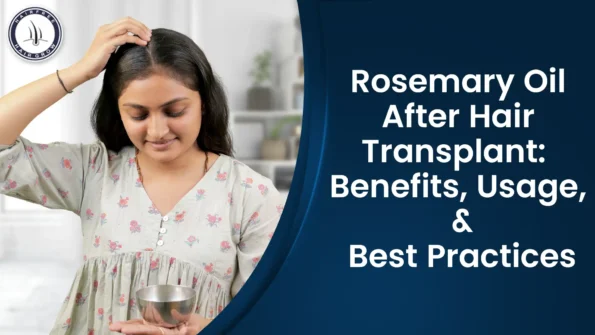A hair transplant is a life-changing procedure for those unable to afford hair loss. However, without post-transplant care, the best results can never be achieved. Here’s whether rosemary oil after hair transplant helps in hair growth and healing. Rosemary oil has been highly appreciated for stimulating hair follicles, maintaining scalp health, and strengthening hair. But when and how should you use it?
In this guide, we will go through:
- The benefits of rosemary oil after hair transplant
- When to use rosemary oil after hair transplant
- The best oils for post-transplant care
- Rosemary oil after hair transplant before and after results
- When can I start using oil after hair transplant?
- When can I use coconut oil after hair transplant?
Benefits of Rosemary Oil After a Hair Transplant
Rosemary oil is a natural essential oil known for its antibacterial, anti-inflammatory, and hair-stimulating properties. It has been used for centuries to promote hair growth and scalp health.
Here’s how rosemary oil after hair transplant can benefit you:
Stimulates Hair Growth
One of the biggest issues after a hair transplant is surviving the transplanted follicles. Rosemary oil strengthens blood circulation to the scalp, enabling it to deliver more oxygen and nutrients to the hair follicles, leading to stronger and healthier hair growth.
Prevents Hair Loss
Many patients experience shock loss after a transplant, where natural hair falls out temporarily. Rosemary oil can help reduce hair shedding and strengthen existing hair to prevent excessive loss.
Reduces Scalp Inflammation
Post-surgery, the scalp may feel red, itchy, and irritated. Rosemary oil has anti-inflammatory and soothing properties, which can help in reducing redness, swelling, and discomfort.
Fights Scalp Infections
The scalp tends to be fragile and more sensitive to bacterial infection after a hair transplant. Antibacterial and antifungal components of rosemary oil help prevent the scalp from getting infected due to bacteria.
Adds Thickness and Strength to Hair
Rosemary oil can gradually help make hair stronger, shinier, and thicker. It works on strengthening hair shafts rather than causing breaks.
How Soon After A Hair Transplant Can Rosemary Oil Be Applied?
Using rosemary oil at the right time is very important. Applying it too early can interfere with healing, and applying it too late may not be of much benefit.
First Two Weeks: Avoid Any Oil Application
- After a hair transplant, your scalp is healing and should be free of oil, dirt, and sweat.
- Applying any oil, including rosemary oil, too soon may clog pores and increase infection risk.
- Follow your surgeon’s aftercare instructions strictly.
After 2-4 Weeks: Application of Light (Diluted with Carrier Oil)
- You can apply rosemary oil in its diluted form when the scabs have fallen and your scalp has healed completely.
- Mix 2-3 drops of rosemary oil with a carrier oil (such as coconut or jojoba oil) and gently massage your scalp, but do not rub or pull too hard on the area newly transplanted.
- At this level, you can apply rosemary oil 2-3 times a week.
- Use a small amount, gently massage, then leave it overnight or for some hours before washing.
- This practice will be helpful in hair regrowth, thickness, and nourishment of the scalp.
Is it Possible to Use a Rosemary Oil Post Hair Transplant?
Yes, but just after healing. Applying it too soon may cause blocked pores, infections, or even irritation. Once healing is complete, rosemary oil can be very helpful in:
- Strengthening transplanted follicles
- Increasing hair density
- Preventing shedding after surgery
Always consult your hair transplant surgeon before undergoing any oil therapy.
Rosemary Oil After Hair Transplant: Before and After Results
Many patients have reported amazing before and after results after using rosemary oil post-transplant.
Before Using Rosemary Oil
- Hair is thin and weak.
- The scalp may feel dry or sensitive.
- Some areas may have slow hair regrowth.
After Using Rosemary Oil for 3-6 Months
- Hair appears thicker and healthier.
- Transplanted follicles grow stronger and faster.
- Reduced hair shedding and breakage.
- The scalp is moisturized and healthy.
Tip: Take monthly pictures to track your hair regrowth progress.
Best Oil After Hair Transplant: Choose This One
While rosemary oil after hair transplant is great, many other oils can also foster hair growth following a transplant.
1. Coconut Oil
- Deeply nourishes the scalp to avoid dryness.
- Antibacterial in nature to protect against infections.
- Strengthens the hair shaft and the follicles.
2. Jojoba Oil
- Closely resembles the sebum (natural oil) of the scalp, so non-greasy.
- Keeps the scalp moisturized.
- Assists in eliminating dandruff.
3. Argan Oil
- Rich in antioxidants and vitamins for healthy hair development.
- Helps in healing damaged hair.
4. Castor Oil
- Rich in ricinoleic acid which enhances hair thickness.
- Improves blood circulation to the hair follicles.
Best Option: Rosemary oil + carrier oil (coconut or jojoba) works the best.
When Can I Start Using Oil After Hair Transplant?
Within 2 Weeks: NO OIL
- Allow the scalp to heal completely.
- Do as your doctor guides you.
Between 2-4 Weeks: Light Application
- 2-3 drops of rosemary oil per carrier oil.
- Use lightly without scrubbing the scalp.
After 1 Month: Everyday Usage
- You may now use oils for strengthening and growth purposes two times a week.
- Don’t overuse it as it may cause blockage to pores.
When Can I Use Coconut Oil After Hair Transplant?
Coconut oil is one of the ideal natural moisturizers but the question is when to use it.
- 1st 2 weeks: Do not use coconut oil as it might lead to infection.
- 2nd to 3rd week: Use a few drops diluted in rosemary oil.
- Apply regularly after 1 month: to hydrate the scalp and strengthen hair.
Conclusion: Is Rosemary Oil Good to Use After Hair Transplant?
Yes! Once your scalp is completely healed, you can use rosemary oil after hair transplant to:
- Promote hair growth
- Strengthen follicles
- Enhance scalp health
- Stop hair loss
However, the timing is critical. Allow at least 2-4 weeks before using any oil. Blend rosemary oil with coconut or jojoba oil for the best nourishment.
Proper care will allow you to achieve thicker, healthier, and stronger hair post-transplant.
Written By
MBBS, DVD (Skin & VD)
Dr. Ankit Jain is a hair restoration expert specializing in post-transplant care. He provides expert guidance on Rosemary Oil After Hair Transplant, helping patients optimize scalp health and hair growth naturally. His evidence-based approach ensures safe and effective recovery for long-lasting results.
Disclaimer
We’ve made all possible efforts to ensure that the information provided here is accurate, up-to-date and complete, however, it should not be treated as a substitute for professional medical advice, diagnosis or treatment. See Detailed Disclaimers Here.


